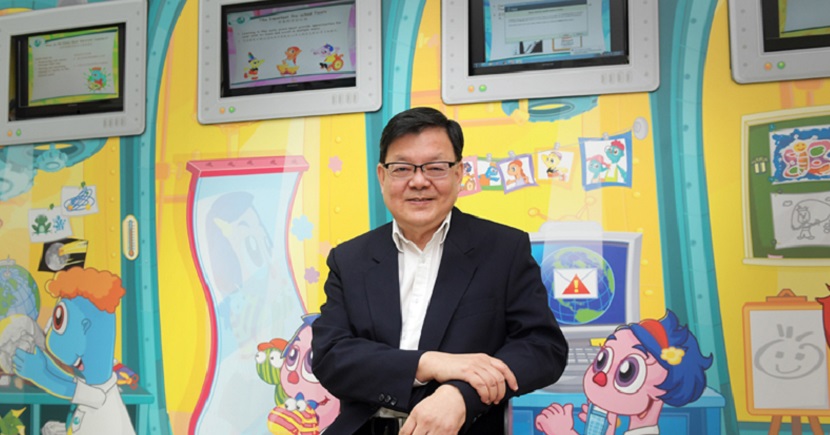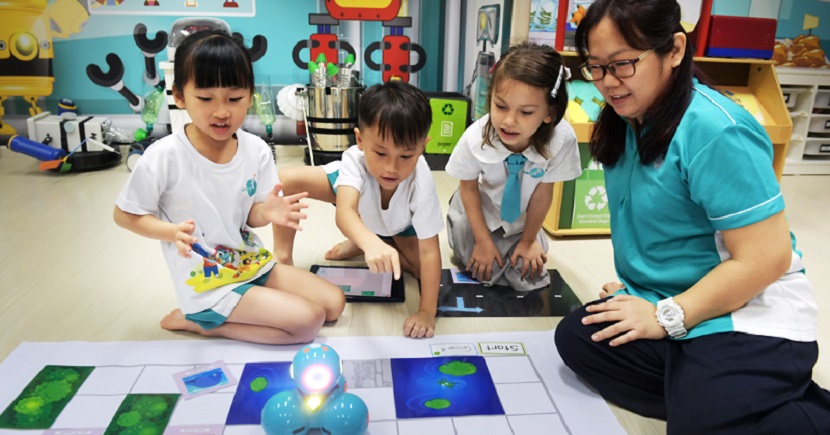First published in The Business Times on 25 March 2020.
Students graduating from ChildFirst, like most other preschoolers, are required to put up a performance. Unlike most other preschoolers, they are also required to show off their coding chops, in the form of a robot dance.
"We officially became a trilingual school in 2017. Before that we had coding but as enrichment. Then we decided this is an important language to know," says Richard Yen, founder of Ednovation.
Ednovation, the holding company of ChildFirst, was established in 1991 and started off as a curriculum design business. They currently operate a preschool and infant-care chain with more than 90 centres across Singapore, China and Asean, through direct ownership or franchisees. These brands include ChildFirst (organically established), Cambridge Preschools, Shaws Preschool, and more recently, LearnRoom.
Mastering the language of technology

Ednovation is a well-established trendsetter. They are one of the early preschools to use technology in teaching and learning, based on Dr Yen's belief that it is important for children to "master the language of technology".
"We cannot really live without technology, even more so into the future. And as you know, learning a language is easiest when you are young," says Dr Yen.
"(Helping children become) a native speaker of technology will help them later on because their whole outlook and how they look at technology (will be) very different."
Before becoming a trilingual school, ChildFirst was a bilingual school; exactly half of the classes are taught in English while the second half of the classes are taught in Mandarin.
Ednovation has a well-established position in the field of curriculum development. Its subsidiary, EdnoLand, undertakes all research and development work for the company.
It has, for instance, developed an EdnoLand portal with eLearning, eTeaching and eTraining resources to support online and home-based learning for students. To make the process more seamless for parents to monitor the learning progress of their children, the company has also developed an accompanying Parent CommApp that functions like a communication book and an in-house app for parents to view eProjects created by their children in school.
Even as he pushes a technology agenda, the scientist-turned-edupreneur, who has a PhD in Physics, makes it clear that it is not just about coding and artificial intelligence (AI).
Dr Yen says: "We take a two-pronged approach. One is by having children learn to be comfortable with technology, hopefully native speakers of technology so they can master technology and not be replaced by it. The other approach is to (help them) be more human."
Instead of competing head-on with AI, it is about learning to use technology to "augment ourselves", says Dr Yen.
Teaching the children how to programme the robot dance, which takes place over several school terms, for instance, involves various skills. These include computational thinking skills which enable students to solve problems systematically and logically, abstraction to extract the essence of the problem, decomposition to break the problem into smaller parts, and pattern recognition.
There are also other soft skills such as team work, collaboration, what it means to experience failure, and trial and error, points out Dr Yen.
"So many skills are learned in this project, skills that are important in the real world, especially today," he says. "Coding is just a word we use but what it really means, is learning many other skills that are important for the future world."
Last year, students from ChildFirst took the first place in the Singapore National Coding & Robotics Competition (Preschool category).
This is a particularly impressive achievement given that the Ministry of Communications and Information announced just last year that coding classes for primary school pupils will be rolled out in 2020. The Code for Fun programme was introduced as an optional programme in 2014. It aims to help students learn computational thinking through basic coding. An expanded programme was piloted in 2019 at some schools after the Primary School Leaving Examinations; this programme is being rolled out to all schools starting this year.
AI's holy grail
Ednovation is looking to use AI to augment its curriculum.
"I think one of the holy grails of AI in education is the ability to personalise learning. Because no matter how low the teacher-student ratio is in the classroom, you can never reach one-to-one," says Dr Yen.
"I would say a good example would be mathematics because it is structured. You can imagine, if the children can do a few problems of this type, the machine can decide whether this child understands this topic, and whether to move on to the next topic. Or, if the child needs more practice on this topic, is it because this way of explaining doesn't work?"
"If you can have such a model of different ways of learning math, the different topics and different methods, you can imagine having an intelligent system that can actually help children navigate and learn at their own pace, in their own way. I believe that is the holy grail for AI in education."

As part of plans to deepen their own AI capabilities to personalise their education curriculum, a programme Ednovation could potentially be rolling out this year includes an interactive cartoon.
Children and their parents or caretakers can take on different roles within the cartoon and repeat certain lines. Speech recognition software would kick in and when a sentence has reached a certain level of accuracy, and replace the voice in the cartoon with the child or adult's voice. When the cartoon is played back, it will be like family members conversing. This will hopefully engage the children and be a fun way for them to practise languages, says Dr Yen.
The concept of personalising education is not new to Ednoland. They plan their lessons around the theory of multiple intelligences, which was developed by Howard Gardner, the Hobbs Professor of Cognition and Education at the Harvard Graduate School of Education. The nine intelligences range from verbal-linguistic intelligence, to musical intelligence, bodily-kinaesthetic intelligence and existential intelligence.
Dr Yen gives an example of an exercise based on the theme of colours. The first set of instructions might involve asking the students to pick their favourite colour (intrapersonal intelligence), they might then be asked to indicate their preferences in the form of a bar chart and count how many of their friends picked a certain colour (mathematical-logical intelligence).
"This talent discovery is for children to try different things and in the end, they hopefully figure out where their talents lie and what they are interested in," says Dr Yen.
Enterprise Singapore supported Ednovation's development of this talent discovery curriculum for pre-schools back in 2014 and was working with Dr Yen and his team from their first venture overseas.
Developing breadth
Ednovation's relationship with Enterprise Singapore goes back to 2006.
ChildFirst, which they established organically, was first set up in Chongqing, China, in 2007. To-date, they have 24 company-owned, company-operated ChildFirst preschools in China. They subsequently opened their first ChildFirst in Singapore in 2010 and have three centres in Singapore to date.
"At that point, this was in 2006 or even earlier, Enterprise Singapore was basically saying 'go west' for China, because the coastal cities were already crowded," says Dr Yen. "So we took that advice and we went to Chongqing. In retrospect that was the right decision. I think if we went to a coastal city we wouldn't be as successful today."
China is currently Ednovation's single largest market outside of Singapore. The second is the Philippines where they work with a master franchisee and have 24 schools under the Cambridge brand.
Ednovation is the 100 per cent owner of ChildFirst and Cambridge and 80 per cent owner of Shaws. The remaining 20 per cent stake in Shaws is held by the brand's founding family.
Dr Yen says they are looking for the right partners to expand the Cambridge brand into Indonesia, Vietnam, and India, whether through franchising and/or joint ventures.
"When I visit India, it reminds me of China many years ago. The country is growing rapidly, the middle class is growing ... of course it's a different country with many unknowns but that's the reason why we're interested to explore that market.
"Of course, there are also other countries in the region. Vietnam for example. A lot of people are interested in that because, I think, they benefited a lot from the trade war. So these are some of the places that we're looking at."
Enterprise Singapore is also working with Ednovation to support their efforts in India.
Dr Yen joined Enterprise Singapore on a trade mission to India where they visited different educational institutions. In addition, upon further understanding his needs, Enterprise Singapore has connected Dr Yen with merger and acquisition consultants in India who can further identify suitable leads and provide acquisition in Singapore.
Currently, the group's revenue stands at about S$70 million and Dr Yen hopes to hit S$100 million in three years time. This is but one of some takeaways Dr Yen has come away with from his journey through Scale-Up SG, which is organised by Enterprise Singapore.
Ednovation was one of the 25 companies chosen for the inaugural run of the programme, which aims to groom aspiring, high-growth local companies into global champions.
"We've been exposed to Wharton Business School's executive programme so we learned some of the latest thinking in management and business. We have also worked with consultants, in our case PwC, to map out our strategy for the next few years.
"Quite a few members of the company participated in the whole process so we brainstormed together with PwC consultants to map out where we should be going and what may make sense for us."
Moving up the value chain
One of Ednovation's more recent acquisitions is LearnRoom, a Beijing-based early education services provider. LearnRoom, which is 100 per cent owned by Ednovation after the acquisition, was founded in 2012 and aims to combine parent-care education, childcare and quality education.
Ednovation currently has two centres in Singapore with infant care built in and moving upstream was a natural extension says Dr Yen.
"In a way it's also a feeder into our preschool because the children graduate from infant-care and then go into childcare. So it forms a natural ecosystem and is a way for us to grow the market as well."
Dr Yen also has plans to further develop this infant-care programme.
"The way they do infant-care is different from Singapore; I would say it's a lot more elaborate," says Dr Yen.
"For the centre, they start with parent involvement. So parents bring the babies to the centre a few times a week and parents learn how to interact with the children, how to help them develop. It's a whole curriculum - not just the caring part, also an education side."
"Whether or not it's applicable to Singapore at this point, we're still studying but there may be a possibility of actually applying some of these techniques to Singapore and maybe even the region later on."
As Ednovation transitions into the execution phase of the Scale-Up SG programme, they are not slowing down.
Indeed, Dr Yen has some big goals he wants to hit in the coming year. These include further developing their teaching and learning models and further implementing the use of technology and AI models; exploring how to integrate infant-care with their current offerings; and geographical expansion.
"After so many years we have accumulated quite a bit of intellectual properties and know-how. So it's time for us to see whether we can share some of this with other countries in the region," says Dr Yen.
"May not be just India. India is certainly attractive because it's a big country and reminds me of China early on; but it can be other other countries in the region as well. So that's that's what we're focusing on."


